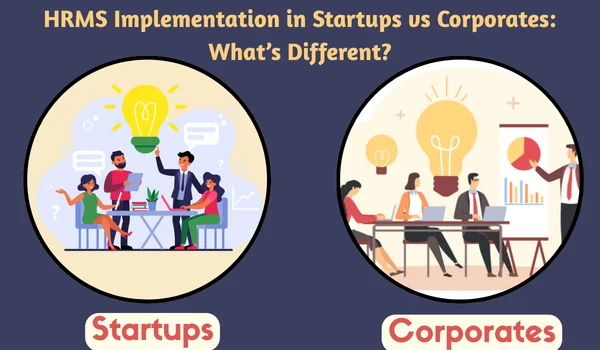Human Resource Management Systems (HRMS) have become essential tools for managing people, processes, and compliance in both startups and large corporate environments. However, while the core purpose of an HRMS remains consistent—streamlining HR operations—the way it’s implemented can differ drastically between startups and corporates. From budget constraints to scalability, from team involvement to training, the implementation journey is shaped by organizational size, structure, and culture.
Let’s explore the key differences in HRMS implementation between startups and corporates in India and why the approach must be tailored accordingly.

Budget and Resource Allocation
Startups:
Startups operate with limited budgets and lean teams. They are typically looking for cost-effective, scalable HRMS solutions with essential features like payroll, attendance, and employee data management. Implementation decisions are driven by immediate needs, and they often opt for cloud-based SaaS HRMS platforms with affordable subscription models.
Corporates:
Corporates have larger budgets and dedicated HR IT teams. They focus on comprehensive HRMS solutions that can handle complex processes like multi-level approvals, international payrolls, advanced analytics, compliance automation, and ERP integration. Implementation is often part of a long-term digital transformation strategy and may involve custom development or enterprise-grade platforms like SAP SuccessFactors, Oracle HCM, or Workday.
Implementation Timeline and Complexity
Startups:
Implementation in startups is generally faster and more agile. Since processes are not rigid, teams are open to adapting workflows to the HRMS instead of heavy customization. The average rollout time can be a few weeks to a couple of months.
Corporates:
In contrast, corporate HRMS implementations can take several months to a year, depending on scale and complexity. Corporates require integration with legacy systems, data migration from multiple sources, and extensive customization to match existing HR policies. Project management involves multiple departments including IT, finance, legal, and compliance.
Change Management and Training
Startups:
Startups have smaller teams, so training is informal and faster. Founders or HR heads often drive implementation directly, making change management smoother. Employees are tech-savvy and adaptable, which helps in quicker onboarding.
Corporates:
With hundreds or thousands of employees, corporates require a structured change management plan. There is more resistance to change, and training needs to be formalized and role-specific. Dedicated support teams, e-learning modules, and vendor-led sessions are common.
Customization vs Standardization
Startups:
Most startups prefer out-of-the-box HRMS features with minimal customization. Flexibility is a key priority, and they want to get the system up and running with quick wins. They often adjust internal processes to fit the software.
Corporates:
Corporates demand high levels of customization to mirror complex organizational structures, workflows, and compliance requirements. They may also require multilingual support, multi-country payroll, and hierarchical access control.
Scalability and Future-readiness
Startups:
Scalability is critical for startups. They may begin with basic features but need an HRMS that can grow with them as they scale from 10 to 500+ employees. Hence, modular systems with plug-and-play capabilities are ideal.
Corporates:
Scalability in corporates is more about global expansion, compliance with diverse regulations, and integration with existing enterprise systems. They look for HRMS platforms with AI, analytics, and mobile capabilities to meet long-term strategic goals.
Decision-Making Process
Startups:
In startups, the decision to implement HRMS is typically made by the founder, CEO, or a small HR team. The selection is quick and informal, with emphasis on ease of use and pricing.
Corporates:
Corporates involve multiple stakeholders—CHROs, CIOs, procurement, legal, and finance. The selection process involves RFPs, vendor presentations, pilot projects, and compliance audits. It’s formal and time-consuming.
Conclusion
While both startups and corporates benefit immensely from HRMS implementation, their journeys are distinctly different. Startups need lean, agile, and affordable solutions that can scale, while corporates require powerful, customizable platforms with extensive integration and support capabilities.
Understanding these differences helps HR leaders choose the right implementation strategy, avoid pitfalls, and ensure that the chosen HRMS aligns with both current needs and future ambitions. Whether you’re a 20-person startup or a 5,000-employee corporate, the success of your HRMS hinges on fit, flexibility, and foresight.

Hi, I am Kapil Kumar, founder and chief editor of indiasvibes.com, a platform delivering the latest updates on business, finance, entertainment, and sports. With a passion for insightful storytelling, I am and my team ensures our readers receive accurate and engaging content.

